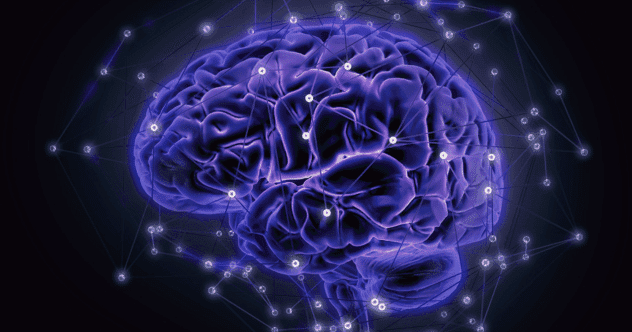Like the deep ocean, the inner workings of our brains are still a significant mystery. While we certainly know a lot about how the brain helps us to function, I bet there are a few things you didn’t know that might surprise that cerebral cortex. Here are 10 fascinating facts about the human brain!
Your Brain Is Power Hungry
The brain is a power-hungry organ, despite its small size. It uses about 20% of our total energy intake, despite weighing only 2% of our total body weight. This energy is used mainly for sending and receiving electrical signals across the brain’s circuits, which is as energy-intensive as you’d think.
Energy consumption varies across the brain. Gray matter, where most of the processing happens, uses more energy than white matter. And specific tasks, like auditory processing, require more energy due to their need for fast and precise signaling.
But this energy isn’t only used when we’re actively thinking or doing something. Even when we are at our most relaxed and resting state, our brains have a high metabolic rate, mostly due to glutamate signaling.
Glutamate signaling is like the body’s group chat. It sends signals (information) between brain cells, helping you learn, remember, and control your actions. Even when you’re asleep, your brain filters and processes outside stimulation and internal signals while maintaining your basic systems.
Even though the brain doesn’t weigh much, it sure knows how to run up the energy bill. And no, there’s no energy-saving mode. You can give your brain its best chance to be efficient by living a healthy lifestyle.
It’s a Neuro-Airport
Around 86 billion neurons call your brain home, and each neuron connects with about 10,000 others. But understanding the human brain is not as simple as knowing the “how” behind the connections. That’s like trying to understand the internet by counting the number of computers linked to it.
Imagine an international airport, like LAX, having 86 billion gates. Now, every single one of these gates has up to 10,000 flights departing for other gates within the same airport. Each flight carries a unique set of information, which could range from a weather report to the script for the next Hollywood blockbuster.
That’s your brain—a supremely busy, ceaselessly active, and incredibly interconnected “airport.” Sometimes you might forget something, not because there’s no more room to store it, but because managing all those connections is a pretty intricate task.
Neurons Are the Immortals of Cells
Neurogenesis, the process of creating new neurons, mostly happens when we’re embryos. The older we get, the slower this process works, but it never stops. Areas involved in learning and memory, like the hippocampus, keep generating new neurons throughout your entire life. Maybe it’s time to change the old adage, “You can’t teach an old dog new tricks,” to something like “You don’t have the patience to teach old dogs a new trick.”
Now, you might be thinking that if we constantly get new neurons, they could be capable of repairing themselves.
Spoiler alert, they can’t… at least not usually.
Promising research shows that new axons can be grown under the right conditions. Still, for now, the process is generally very slow and never fully complete. The benefit is that the neurons we make typically stick with us for life, and they can be great at adapting. The brain is remarkable—if some of your neurons are damaged or impaired, it will try to reroute and reorganize itself to adapt.
Going back to the airport analogy, if one or more of your gates is closed, those 10,000 flights will be redirected to nearby gates. Unfortunately, there is only so much that the remaining gates can handle before flights are affected.
The term for this adaptability is neuroplasticity. This is how fast your brain can adapt to change, whether voluntarily or forced. That’s why kids are so much better at learning languages. So do your brain a favor, wear your helmet, and always prioritize brain health.
“Now That’s What I Call High-Quality H20”
Soft tofu or room-temperature butter probably doesn’t pop into your mind when you think of brains. But those are the most apt ways to describe touching one. Our brains are firm enough to hold their shape but soft enough to be affected by even slight environmental changes.
Approximately 73% of your brain is water, making hydration the best thing you can do to keep peak brain function. Water is critical in cell communication, waste removal, and nutrient transportation within the brain.
When your brain dehydrates, even a little bit, cognitive performance can drop up to 5%. That drop includes decision-making abilities. The short-term memory starts having problems with a 2% decrease in brain hydration.
In fact, prolonged dehydration may lead to brain cell shrinkage and symptoms like fatigue, sleep issues, and lack of mental clarity. So I’ll say it again, DRINK YOUR WATER; your brain will thank you.
Faster Than Formula 1 Racers
Information in the brain travels at varying speeds, depending on the type of neuron and its myelination. Yet, the brain can process information as fast as 268 mph (431 km/h). The slowest is around 1 mph (1.6 km/h). That’s quite the difference.
The speed the brain can receive, interpret, and respond to information is a vital cognitive ability. It determines how quickly we can process and understand incoming stimuli. Think of it as spidey-sense in real life.
Lots of things can affect processing speed. The health and efficiency of the brain’s neural networks play a significant role, but strong neural connections and well-functioning pathways make information transmission more efficient. Optimal levels of neurotransmitters, like dopamine and acetylcholine, can increase efficient communication between neurons as well.
Third, physical exercise has been proven to also increase the brain’s processing speed. Exercise increases blood flow around the body, including to the brain. And all that blood delivers more oxygen and nutrients necessary for optimal brain function.
It’s not just physical exercise that’s good, though. Activities that challenge the brain can also improve processing speed by strengthening neural connections and plasticity.
100,000 Miles in a Cantaloupe
It should come as no surprise that the brain requires a constant blood supply to meet its high energy demands. Remember, the brain uses 20% of your energy; that’s why cerebral blood vessels are so important. They deliver a constant flow of highly regulated blood carrying oxygen, glucose, and other nutrients to brain cells while removing metabolic waste products.
Not only is the brain a constant energy vampire, but it also happens to be particular about what it wants, and that’s where the blood-brain barrier (BBB) comes in. The BBB is the highly selective barrier that strictly regulates what passes between the blood and the brain. It is essentially the bouncer to “Club Brain.” Its entire purpose is to maintain the best internal environment.
Not to mention that different sections of your brain need varying flow rates and pressure. All of this takes a massive amount of infrastructure to get right. The structure of cerebral blood vessels is specifically adapted to meet these unique requirements.
They’ve formed a network of capillaries that ensures every part of the brain is given the exact oxygen and nutrients it needs. It’s such a dense network that if laid end to end, the vessels would stretch about 100,000 miles (160,934 km)—enough to wrap around Earth more than four times.
All that in a space roughly the size of a cantaloupe.
10% Is a Lie
We’ve all heard it. Humans use 10% or less of their brains. Wrong! The fact is, no one knows why that became the common belief.
Here’s a brief history of this myth:
- 1907 William James says humans only use part of their brain’s resources
- 1936 Dale Carnegie references it as a thing his college professor would say
- Some scientists believe that neurons make up 10% of all brain cells
- Hollywood includes it in books, shows, and movies
Notice how 10% is only in there once, but it’s likely that all these contributed to the myth growing and becoming so commonly accepted.
Really, we have no idea how much of the brain is used since we don’t have imaging technology advanced enough to say accurately. One study did note that 77% of visual neurons appear to do something, and dark neurons probably serve some purpose for survival we don’t know how to test for.
What is clear, though, is that virtually every part of the brain is active most of the time. Even while sleeping, the brain is hard at work.
And since we are exposing lies, “left-brained” and “right-brained” thought dominance is also fiction. Studies show that both hemispheres are involved in cognitive functions, and no side dominates. In both cases, the original research was done 40+ years ago.
Light Bulb!
Every time you remember the lyrics to your favorite song or calculate a tip, your neurons send electrical signals to each other. Individually, neurons aren’t that impressive in terms of the energy they transmit. But all together, they generate between 12-20 watts.
It’s not enough to power your phone or computer, but it could light up a low-wattage bulb. Now add in that the brain can perform tasks that Siri, Alexa, or any other AI can’t… for now, at least.
The harder you work, your brain will determine how much electricity is produced, but with that comes heat. This heat makes your brain’s temperature fluctuate throughout the day. With the level of mental activity, parts reach around 104°F (40°C).
It’s probably not surprising since thinking hard makes more neurons fire, which demands more energy and produces increased heat. Just like anything electronic, the more it’s used, the hotter it gets.
Luckily, when under intense usage or stress, your brain directs more blood toward itself to meet higher energy demands and dissipate heat for peak performance.
Under Perpetual Construction
When is the brain fully developed? Technically, the brain reaches structural maturity in our mid-twenties. That’s when the prefrontal cortex, the area responsible for executive functions like decision-making, impulse control, and managing complex tasks, finishes its structural development.
Thankfully, the brain’s capacity to develop and adapt never really stops. Remember, plasticity is the brain’s ability to change and adapt throughout our lives.
Essentially, our brains keep learning, changing, and adapting, keeping us on our toes. So the honest answer to that question is that our brains are constantly developing.
Your Personal DVR
Have you ever wondered what the limit is on how much your mind can remember? Believe it or not, there is an estimated end zone.
The human brain has an estimated storage capacity of about 2.5 petabytes (2.5 million gigabytes), which is roughly equivalent to 3 million hours of TV shows. So technically, you could file away every episode of Friends and still have space for the entire Marvel and Star Wars franchises… and more.
Your mind has an incredible capacity to remember just about anything, but it’s the recall that makes it possible for you to go back through your mental collection. Adults only have about 20 minutes of attention to give at a time, and it’s tough to remember every important fact you know in so short a time.
The next time you find yourself walking into a room and forgetting why you went there in the first place, know that your brain remembers, even if you don’t.
From its immense power consumption to its surprising ability to store vast amounts of information, the human brain is a marvel. We’ve uncovered some surprising facts, like how it continues to develop well into your twenties and the truth about the 10% myth. Understanding these aspects of our brains not only satisfies our curiosity but also encourages us to take better care of this vital organ.
What fact surprised you the most? Share your thoughts in the comments below!










